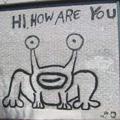Jim Brown reviewed October by China Miéville
In the weeds but/and a good read
It feels strange to call this a "fun read," but it's how I'd describe it. It's detailed and in the weeds, but Miéville is an incredible storyteller and researcher. As with his book on the Communist Manifesto, he's relying on existing research. But he has clearly read it all. He cuts no corners.
The best part about this book is the description of Lenin's disguises and various stealth movements across Russia and Finland.
The conclusion has a great meditation on how the revolutionaries were referred to as "switchmen" because they met secretly a train switch stations. Miéville uses this to think about the paths of history taken and those not taken. Vintage Miéville.
It feels strange to call this a "fun read," but it's how I'd describe it. It's detailed and in the weeds, but Miéville is an incredible storyteller and researcher. As with his book on the Communist Manifesto, he's relying on existing research. But he has clearly read it all. He cuts no corners.
The best part about this book is the description of Lenin's disguises and various stealth movements across Russia and Finland.
The conclusion has a great meditation on how the revolutionaries were referred to as "switchmen" because they met secretly a train switch stations. Miéville uses this to think about the paths of history taken and those not taken. Vintage Miéville.















